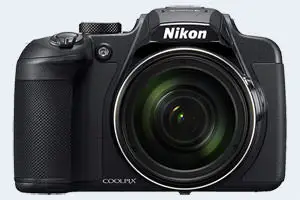Canon M vs Nikon B700
The Canon EOS M and the Nikon Coolpix B700 are two digital cameras that were announced, respectively, in July 2012 and February 2016. The Canon M is a mirrorless interchangeable lens camera, while the B700 is a fixed lens compact. The cameras are based on an APS-C (Canon M) and a 1/2.3-inch (B700) sensor. The Canon has a resolution of 17.9 megapixels, whereas the Nikon provides 20.2 MP.
Below is an overview of the main specs of the two cameras as a starting point for the comparison.

Check Canon M offers at
ebay.com

Check B700 offers at
ebay.com
Going beyond this snapshot of core features and characteristics, what are the differences between the Canon EOS M and the Nikon Coolpix B700? Which one should you buy? Read on to find out how these two cameras compare with respect to their body size, their imaging sensors, their shooting features, their input-output connections, and their reception by expert reviewers.
Body comparison
An illustration of the physical size and weight of the Canon M and the Nikon B700 is provided in the side-by-side display below. The two cameras are presented according to their relative size. Three consecutive views from the front, the top, and the rear side are shown. All width, height and depth dimensions are rounded to the nearest millimeter.
The Canon M can be obtained in two different colors (black, white), while the B700 is also available in two color-versions, but different ones (black, red).
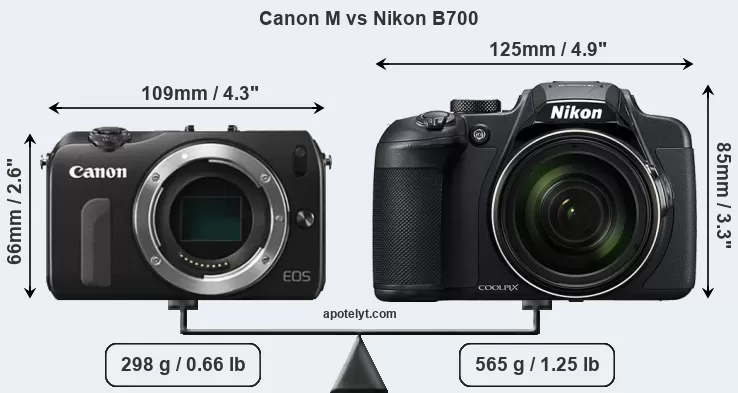
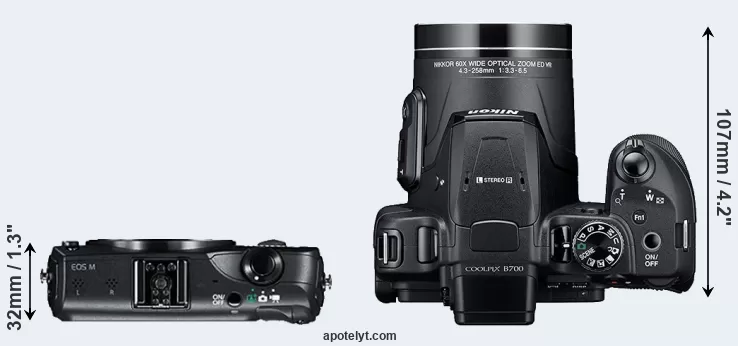
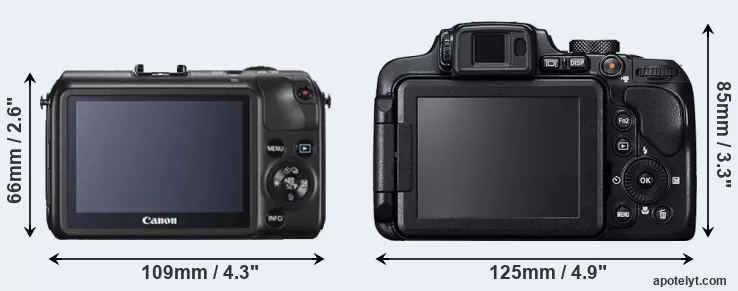
If the front view area (width x height) of the cameras is taken as an aggregate measure of their size, the Nikon B700 is considerably larger (48 percent) than the Canon M. In this context, it is worth noting that neither the Canon M nor the B700 are weather-sealed.
The above size and weight comparisons are to some extent incomplete and possibly misleading, as the B700 has a lens built in, whereas the Canon M is an interchangeable lens camera that requires a separate lens. Attaching the latter will add extra weight and bulk to the setup.
Concerning battery life, the Canon M gets 230 shots out of its Canon LP-E12 battery, while the B700 can take 350 images on a single charge of its Nikon EN-EL23 power pack. The power pack in the B700 can be charged via the USB port, which can be very convenient when travelling.
The table below summarizes the key physical specs of the two cameras alongside a broader set of comparators. If you would like to visualize and compare a different camera combination, you can navigate to the CAM-parator app and make your selection from a broad list of cameras there.

| Camera Model |
Camera Width |
Camera Height |
Camera Depth |
Camera Weight |
Battery Life |
Weather Sealing |
Camera Launch |
Launch Price (USD) |
Street Price |
||
|---|---|---|---|---|---|---|---|---|---|---|---|
| 1. | Canon M | 109 mm | 66 mm | 32 mm | 298 g | 230 | n | Jul 2012 | 599 | ebay.com | |
| 2. | Nikon B700 | 125 mm | 85 mm | 107 mm | 565 g | 350 | n | Feb 2016 | 499 | ebay.com | |
| 3. | Canon G7 X | 103 mm | 60 mm | 40 mm | 304 g | 210 | n | Sep 2014 | 699 | ebay.com | |
| 4. | Canon G16 | 109 mm | 76 mm | 40 mm | 356 g | 360 | n | Aug 2013 | 549 | ebay.com | |
| 5. | Canon M10 | 108 mm | 67 mm | 35 mm | 301 g | 255 | n | Oct 2015 | 499 | ebay.com | |
| 6. | Canon M100 | 108 mm | 67 mm | 35 mm | 302 g | 295 | n | Aug 2017 | 499 | ebay.com | |
| 7. | Canon SL1 | 117 mm | 91 mm | 69 mm | 407 g | 380 | n | Mar 2013 | 549 | ebay.com | |
| 8. | Canon T3i | 133 mm | 100 mm | 80 mm | 570 g | 440 | n | Feb 2011 | 599 | ebay.com | |
| 9. | Canon T5i | 133 mm | 100 mm | 79 mm | 580 g | 440 | n | Mar 2013 | 649 | ebay.com | |
| 10. | Kodak AZ901 | 139 mm | 104 mm | 119 mm | 777 g | 400 | n | Jan 2016 | 499 | amazon.com | |
| 11. | Nikon P900 | 140 mm | 103 mm | 137 mm | 899 g | 360 | n | Mar 2015 | 599 | ebay.com | |
| 12. | Panasonic G3 | 115 mm | 84 mm | 47 mm | 336 g | 270 | n | May 2011 | 599 | ebay.com | |
| 13. | Panasonic GF6 | 111 mm | 65 mm | 38 mm | 323 g | 340 | n | Apr 2013 | 499 | ebay.com | |
| 14. | Panasonic ZS70 | 112 mm | 67 mm | 41 mm | 322 g | 380 | n | Apr 2017 | 449 | ebay.com | |
| 15. | Sony HX350 | 130 mm | 93 mm | 103 mm | 652 g | 300 | n | Dec 2016 | 449 | ebay.com | |
| 16. | Sony HX400V | 130 mm | 93 mm | 103 mm | 660 g | 300 | n | Feb 2014 | 499 | ebay.com | |
| 17. | Sony NEX-3N | 110 mm | 62 mm | 35 mm | 269 g | 480 | n | Feb 2013 | 499 | ebay.com | |
| Note: Measurements and pricing do not include easily detachable parts, such as add-on or interchangeable lenses or optional viewfinders. | |||||||||||
Any camera decision will naturally be influenced heavily by the price. The listed launch prices provide an indication of the market segment that the manufacturer of the cameras have been targeting. The B700 was launched at a lower price than the Canon M, despite having a lens built in. Normally, street prices remain initially close to the MSRP, but after a couple of months, the first discounts appear. Later in the product cycle and, in particular, when the replacement model is about to appear, further discounting and stock clearance sales often push the camera price considerably down. Then, after the new model is out, very good deals can frequently be found on the pre-owned market.
Sensor comparison
The size of the imaging sensor is a crucial determinant of image quality. A large sensor will generally have larger individual pixels that offer better low-light sensitivity, provide wider dynamic range, and have richer color-depth than smaller pixels in a sensor of the same technological generation. Furthermore, a large sensor camera will give the photographer more possibilities to use shallow depth-of-field in order to isolate a subject from the background. On the downside, larger sensors tend to be associated with larger, more expensive camera bodies and lenses.
Of the two cameras under consideration, the Canon M features an APS-C sensor and the Nikon B700 a 1/2.3-inch sensor. The sensor area in the B700 is 92 percent smaller. As a result of these sensor size differences, the cameras have a format factor of, respectively, 1.6 and 5.6. The sensor in the Canon M has a native 3:2 aspect ratio, while the one in the B700 offers a 4:3 aspect.
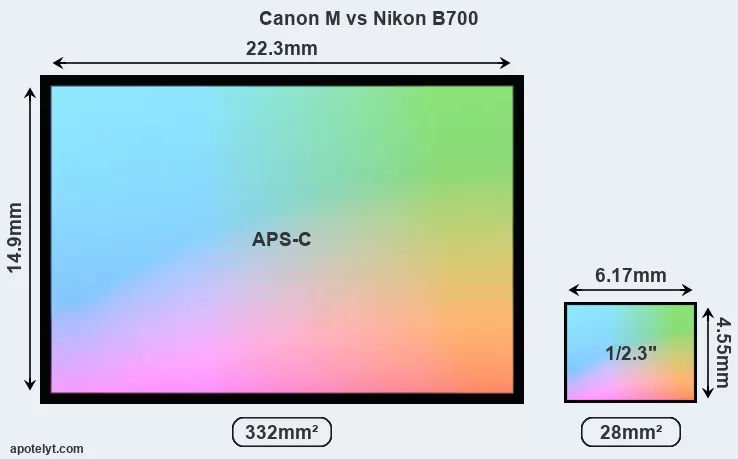
Despite having a smaller sensor, the B700 offers a higher resolution of 20.2 megapixels, compared with 17.9 MP of the Canon M. This megapixels advantage comes at the cost of a higher pixel density and a smaller size of the individual pixel (with a pixel pitch of 1.18μm versus 4.31μm for the Canon M). However, it should be noted that the B700 is much more recent (by 3 years and 7 months) than the Canon M, and its sensor will have benefitted from technological advances during this time that make it possible to gather light more efficiently. Coming back to sensor resolution, it should be mentioned that the B700 has no anti-alias filter installed, so that it can capture all the detail its sensor resolves.
The Canon M has on-sensor phase detect pixels, which results in fast and reliable autofocus acquisition even during live view operation.
The Canon EOS M has a native sensitivity range from ISO 100 to ISO 12800, which can be extended to ISO 100-25600. The corresponding ISO settings for the Nikon Coolpix B700 are ISO 100 to ISO 3200 (no boost).
In terms of underlying technology, the Canon M is build around a CMOS sensor, while the B700 uses a BSI-CMOS imager. Both cameras use a Bayer filter for capturing RGB colors on a square grid of photosensors. This arrangement is found in most digital cameras.
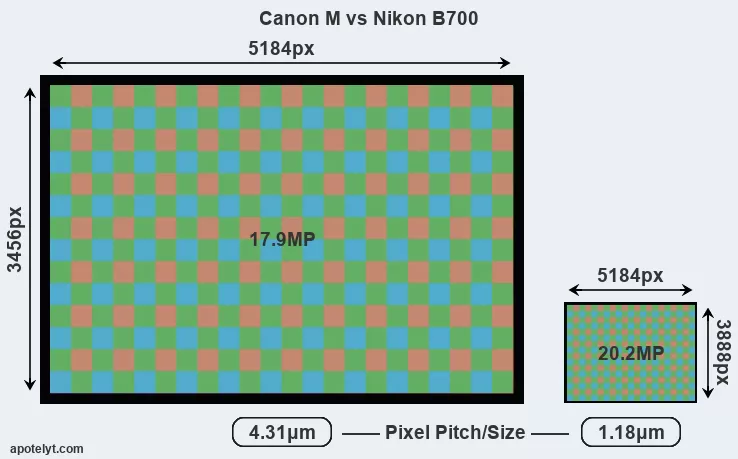
Consistent information on actual sensor performance is available from DXO Mark for many cameras. This service determines an overall sensor rating, as well as sub-scores for low-light sensitivity ("DXO Sports"), dynamic range ("DXO Landscape"), and color depth ("DXO Portrait"). The adjacent table reports on the physical sensor characteristics and the outcomes of the DXO sensor quality tests for a sample of comparator-cameras.

| Camera Model |
Sensor Class |
Resolution (MP) |
Horiz. Pixels |
Vert. Pixels |
Video Format |
DXO Portrait |
DXO Landscape |
DXO Sports |
DXO Overall |
||
|---|---|---|---|---|---|---|---|---|---|---|---|
| 1. | Canon M | APS-C | 17.9 | 5184 | 3456 | 1080/30p | 22.1 | 11.2 | 827 | 65 | |
| 2. | Nikon B700 | 1/2.3 | 20.2 | 5184 | 3888 | 4K/30p | 20.4 | 11.8 | 818 | 48 | |
| 3. | Canon G7 X | 1-inch | 20.0 | 5472 | 3648 | 1080/60p | 23.0 | 12.7 | 556 | 71 | |
| 4. | Canon G16 | 1/1.7 | 12.0 | 4000 | 3000 | 1080/60p | 21.0 | 11.7 | 230 | 54 | |
| 5. | Canon M10 | APS-C | 17.9 | 5184 | 3456 | 1080/30p | 22.2 | 11.4 | 753 | 65 | |
| 6. | Canon M100 | APS-C | 24.0 | 6000 | 4000 | 1080/60p | 23.5 | 12.9 | 1272 | 78 | |
| 7. | Canon SL1 | APS-C | 17.9 | 5184 | 3456 | 1080/30p | 21.8 | 11.3 | 843 | 63 | |
| 8. | Canon T3i | APS-C | 17.9 | 5184 | 3456 | 1080/30p | 22.1 | 11.5 | 793 | 65 | |
| 9. | Canon T5i | APS-C | 17.9 | 5184 | 3456 | 1080/30p | 21.7 | 11.2 | 681 | 61 | |
| 10. | Kodak AZ901 | 1/2.3 | 20.2 | 5184 | 3888 | 1080/30p | 20.3 | 11.7 | 806 | 48 | |
| 11. | Nikon P900 | 1/2.3 | 15.9 | 4608 | 3456 | 1080/60p | 20.2 | 11.6 | 727 | 47 | |
| 12. | Panasonic G3 | Four Thirds | 15.8 | 4592 | 3448 | 1080/60i | 21.0 | 10.6 | 667 | 56 | |
| 13. | Panasonic GF6 | Four Thirds | 15.8 | 4592 | 3448 | 1080/60i | 20.7 | 10.6 | 622 | 54 | |
| 14. | Panasonic ZS70 | 1/2.3 | 20.2 | 5184 | 3888 | 4K/30p | 19.1 | 10.6 | 106 | 36 | |
| 15. | Sony HX350 | 1/2.3 | 19.9 | 5152 | 3864 | 1080/60p | 20.5 | 11.9 | 896 | 49 | |
| 16. | Sony HX400V | 1/2.3 | 20.2 | 5184 | 3888 | 1080/60p | 20.1 | 11.4 | 629 | 45 | |
| 17. | Sony NEX-3N | APS-C | 16.0 | 4912 | 3264 | 1080/60i | 22.8 | 12.5 | 1067 | 74 | |
| Note: DXO values in italics represent estimates based on sensor size and age. | |||||||||||
Many modern cameras are not only capable of taking still images, but can also record movies. Both cameras under consideration have a sensor with sufficiently fast read-out times for moving pictures, but the B700 provides a better video resolution than the Canon M. It can shoot movie footage at 4K/30p, while the Canon is limited to 1080/30p.
Feature comparison
Apart from body and sensor, cameras can and do differ across a range of features. For example, the B700 has an electronic viewfinder (921k dots), which can be very helpful when shooting in bright sunlight. In contrast, the Canon M relies on live view and the rear LCD for framing. The adjacent table lists some of the other core features of the Canon M and Nikon B700 along with similar information for a selection of comparators.

| Camera Model |
Viewfinder (Type or 000 dots) |
Control Panel (yes/no) |
LCD Specifications (inch/000 dots) |
LCD Attach- ment |
Touch Screen (yes/no) |
Max Shutter Speed * |
Max Shutter Flaps * |
Built-in Flash (yes/no) |
Built-in Image Stab |
||
|---|---|---|---|---|---|---|---|---|---|---|---|
| 1. | Canon M | none | n | 3.0 / 1040 | fixed | Y | 1/4000s | 4.3/s | n | n | |
| 2. | Nikon B700 | 921 | n | 3.0 / 921 | swivel | n | 1/4000s | 5.0/s | Y | Y | |
| 3. | Canon G7 X | none | n | 3.0 / 1040 | tilting | Y | 1/2000s | 6.5/s | Y | Y | |
| 4. | Canon G16 | optical | n | 3.0 / 922 | fixed | n | 1/4000s | 2.2/s | Y | Y | |
| 5. | Canon M10 | none | n | 3.0 / 1040 | tilting | Y | 1/4000s | 4.6/s | Y | n | |
| 6. | Canon M100 | none | n | 3.0 / 1040 | tilting | Y | 1/4000s | 6.1/s | Y | n | |
| 7. | Canon SL1 | optical | n | 3.0 / 1040 | fixed | Y | 1/4000s | 4.9/s | Y | n | |
| 8. | Canon T3i | optical | n | 3.0 / 1040 | swivel | n | 1/4000s | 3.7/s | Y | n | |
| 9. | Canon T5i | optical | n | 3.0 / 1040 | swivel | Y | 1/4000s | 5.0/s | Y | n | |
| 10. | Kodak AZ901 | 202 | n | 3.0 / 920 | swivel | n | 1/2000s | 5.0/s | Y | Y | |
| 11. | Nikon P900 | 921 | n | 3.0 / 921 | swivel | n | 1/4000s | 7.0/s | Y | Y | |
| 12. | Panasonic G3 | 1440 | n | 3.0 / 460 | swivel | Y | 1/4000s | 4.0/s | Y | n | |
| 13. | Panasonic GF6 | none | n | 3.0 / 1040 | tilting | Y | 1/4000s | 4.2/s | Y | n | |
| 14. | Panasonic ZS70 | 1166 | n | 3.0 / 1040 | tilting | Y | 1/2000s | 10.0/s | Y | Y | |
| 15. | Sony HX350 | 202 | n | 3.0 / 922 | tilting | n | 1/4000s | 10.0/s | Y | Y | |
| 16. | Sony HX400V | 210 | n | 3.0 / 921 | tilting | n | 1/4000s | 10.0/s | Y | Y | |
| 17. | Sony NEX-3N | optional | n | 3.0 / 460 | tilting | n | 1/4000s | 4.0/s | Y | n | |
| Note: *) Information refers to the mechanical shutter, unless the camera only has an electronic one. | |||||||||||
One differentiating feature between the two cameras concerns the touch sensitivity of the rear screen. The Canon M has a touchscreen, while the B700 has a conventional panel. Touch control can be particularly helpful, for example, for setting the focus point.
The B700 has an articulated screen that can be turned to be front-facing. This characteristic will be appreciated by vloggers and photographers who are interested in taking selfies. In contrast, the Canon M does not have a selfie-screen.The Nikon B700 has an intervalometer built-in. This enables the photographer to capture time lapse sequences, such as flower blooming, a sunset or moon rise, without purchasing an external camera trigger and related software.
Concerning the storage of imaging data, both the Canon M and the B700 write their files to SDXC cards. The Canon M supports UHS-I cards (Ultra High Speed data transfer of up to 104 MB/s), while the B700 cannot take advantage of Ultra High Speed SD cards.
Connectivity comparison
For some imaging applications, the extent to which a camera can communicate with its environment can be an important aspect in the camera decision process. The table below provides an overview of the connectivity of the Canon EOS M and Nikon Coolpix B700 and, in particular, the interfaces the cameras (and selected comparators) provide for accessory control and data transfer.

| Camera Model |
Hotshoe Port |
Internal Mic / Speaker |
Microphone Port |
Headphone Port |
HDMI Port |
USB Port |
WiFi Support |
NFC Support |
Bluetooth Support |
||
|---|---|---|---|---|---|---|---|---|---|---|---|
| 1. | Canon M | Y | stereo / mono | Y | - | mini | 2.0 | - | - | - | |
| 2. | Nikon B700 | - | stereo / mono | - | - | micro | 2.0 | Y | Y | Y | |
| 3. | Canon G7 X | - | stereo / mono | - | - | micro | 2.0 | Y | Y | - | |
| 4. | Canon G16 | Y | stereo / mono | - | - | mini | 2.0 | Y | - | - | |
| 5. | Canon M10 | - | stereo / mono | - | - | mini | 2.0 | Y | Y | - | |
| 6. | Canon M100 | - | stereo / mono | - | - | micro | 2.0 | Y | Y | Y | |
| 7. | Canon SL1 | Y | mono / mono | Y | - | mini | 2.0 | - | - | - | |
| 8. | Canon T3i | Y | mono / mono | Y | - | mini | 2.0 | - | - | - | |
| 9. | Canon T5i | Y | stereo / mono | Y | - | mini | 2.0 | - | - | - | |
| 10. | Kodak AZ901 | - | stereo / mono | - | - | micro | 2.0 | Y | - | - | |
| 11. | Nikon P900 | - | stereo / mono | - | - | micro | 2.0 | Y | Y | - | |
| 12. | Panasonic G3 | Y | stereo / mono | - | - | mini | 2.0 | - | - | - | |
| 13. | Panasonic GF6 | - | stereo / mono | - | - | mini | 2.0 | Y | Y | - | |
| 14. | Panasonic ZS70 | - | stereo / mono | - | - | micro | 2.0 | Y | - | - | |
| 15. | Sony HX350 | - | stereo / mono | - | - | micro | 2.0 | - | - | - | |
| 16. | Sony HX400V | Y | stereo / mono | - | - | micro | 2.0 | Y | Y | - | |
| 17. | Sony NEX-3N | - | stereo / mono | - | - | micro | 2.0 | - | - | - |
It is notable that the Canon M has a hotshoe, while the B700 does not. This socket makes it possible to easily attach optional accessories, such as an external flash gun.
Both the Canon M and the B700 have been discontinued, but can regularly be found used on ebay. The Canon M was replaced by the Canon EOS M3, while the B700 does not have a direct successor. Further information on the features and operation of the Canon M and B700 can be found, respectively, in the Canon M Manual (free pdf) or the online Nikon B700 Manual.
Review summary
So what conclusions can be drawn? Is the Canon M better than the Nikon B700 or vice versa? The listing below highlights the relative strengths of the two models.

Advantages of the Canon EOS M:
- Better moiré control: Has an anti-alias filter to avoid artificial patterns to appear in images.
- Better image quality: Features bigger pixels on a larger sensor for higher quality imaging.
- Richer colors: The pixel size advantage translates into images with better, more accurate colors.
- More dynamic range: Larger pixels capture a wider spectrum of light and dark details.
- Better low-light sensitivity: Larger pixels means good image quality even under poor lighting.
- Better live-view autofocus: Features on-sensor phase-detection for more confident autofocus.
- Better sound: Can connect to an external microphone for higher quality sound recording.
- More detailed LCD: Has a higher resolution rear screen (1040k vs 921k dots).
- Fewer buttons to press: Is equipped with a touch-sensitive rear screen to facilitate handling.
- More flexible: Accepts interchangeable lenses, so that lens characteristics can be altered.
- More compact: Is smaller (109x66mm vs 125x85mm) and thus needs less room in the bag.
- Better lighting: Features a hotshoe and can thus hold and trigger an external flash gun.
- Faster buffer clearing: Has an SD card interface that supports the UHS-I standard.
- More heavily discounted: Has been available for much longer (launched in July 2012).

Arguments in favor of the Nikon Coolpix B700:
- Maximized detail: Lacks an anti-alias filter to exploit the sensor's full resolution potential.
- Better video: Provides higher definition movie capture (4K/30p vs 1080/30p).
- Easier framing: Has an electronic viewfinder for image composition and settings control.
- More flexible LCD: Has a swivel screen for odd-angle shots in portrait or landscape orientation.
- More selfie-friendly: Has an articulated screen that can be turned to be front-facing.
- Faster burst: Shoots at higher frequency (5 vs 4.3 flaps/sec) to capture the decisive moment.
- Easier time-lapse photography: Has an intervalometer built-in for low frequency shooting.
- Ready to shoot: Has an integrated lens, whereas the Canon M necessitates an extra lens.
- Longer lasting: Gets more shots (350 versus 230) out of a single battery charge.
- Easier travel charging: Can be conveniently charged via its USB port.
- Sharper images: Has stabilization technology built-in to reduce the impact of hand-shake.
- Easier fill-in: Has a small integrated flash to brighten shadows of backlit subjects.
- Easier file upload: Has wifi built in for automatic backup or image transfer to the web.
- Easier device pairing: Supports NFC for fast wireless image transfer over short distances.
- Easier wireless transfer: Supports Bluetooth for image sharing without cables.
- More affordable: Was introduced at a lower price, despite coming with a built-in lens.
- More modern: Reflects 3 years and 7 months of technical progress since the Canon M launch.
If the number of relative strengths (bullet points above) is taken as a guide, the B700 emerges as the winner of the match-up (17 : 14 points). However, the relevance of individual strengths will vary across photographers, so that you might want to apply your own weighing scheme to the summary points when reflecting and deciding on a new camera. A professional wedding photographer will view the differences between cameras in a way that diverges from the perspective of a travel photog, and a person interested in cityscapes has distinct needs from a macro shooter. Hence, the decision which camera is best and worth buying is often a very personal one.
How about other alternatives? Do the specifications of the Canon M and the Nikon B700 place the cameras among the top in their class? Find out in the latest Best Mirrorless Interchangeable Lens Camera and Best Superzoom Camera listings whether the two cameras rank among the cream of the crop.
In any case, while the comparison of technical specifications can provide a useful overview of the capabilities of different cameras, it remains incomplete and does no justice, for example, to the way the Canon M or the B700 perform in practice. User reviews that are available, for instance, at amazon can sometimes shed light on these issues, but such feedback is all too often partial, inconsistent, and inaccurate.
Expert reviews
This is why hands-on reviews by experts are important. The following table reports the overall ratings of the cameras as published by some of the major camera review sites (amateurphotographer [AP], cameralabs [CL], digitalcameraworld [DCW], dpreview [DPR], ephotozine [EPZ], photographyblog [PB]). As can be seen, the professional reviewers agree in many cases on the quality of different cameras, but sometimes their assessments diverge, reinforcing the earlier point that a camera decision is often a very personal choice.

| Camera Model |
AP score |
CL score |
DCW score |
DPR score |
EPZ score |
PB score |
Camera Launch |
Launch Price (USD) |
Street Price |
||
|---|---|---|---|---|---|---|---|---|---|---|---|
| 1. | Canon M | 3/5 | + | .. | .. | 4/5 | 4/5 | Jul 2012 | 599 | ebay.com | |
| 2. | Nikon B700 | .. | + | .. | .. | 4/5 | 4/5 | Feb 2016 | 499 | ebay.com | |
| 3. | Canon G7 X | 4/5 | + + | .. | 77/100 | 4.5/5 | 4.5/5 | Sep 2014 | 699 | ebay.com | |
| 4. | Canon G16 | 4/5 | + | .. | .. | 4.5/5 | 4.5/5 | Aug 2013 | 549 | ebay.com | |
| 5. | Canon M10 | .. | .. | .. | .. | .. | 4/5 | Oct 2015 | 499 | ebay.com | |
| 6. | Canon M100 | 3/5 | + | .. | .. | 4/5 | 3.5/5 | Aug 2017 | 499 | ebay.com | |
| 7. | Canon SL1 | 4/5 | + | .. | 78/100 | 4/5 | 4/5 | Mar 2013 | 549 | ebay.com | |
| 8. | Canon T3i | 3/5 | o | .. | 77/100 | 4.5/5 | 4.5/5 | Feb 2011 | 599 | ebay.com | |
| 9. | Canon T5i | .. | .. | .. | 76/100 | 4.5/5 | 4.5/5 | Mar 2013 | 649 | ebay.com | |
| 10. | Kodak AZ901 | .. | .. | .. | .. | 3.5/5 | 3/5 | Jan 2016 | 499 | amazon.com | |
| 11. | Nikon P900 | .. | .. | .. | 77/100 | 4/5 | 4/5 | Mar 2015 | 599 | ebay.com | |
| 12. | Panasonic G3 | 3/5 | + + | .. | 75/100 | 4.5/5 | 5/5 | May 2011 | 599 | ebay.com | |
| 13. | Panasonic GF6 | .. | + + | .. | .. | 4.5/5 | 4.5/5 | Apr 2013 | 499 | ebay.com | |
| 14. | Panasonic ZS70 | .. | + + | .. | .. | 4/5 | 4/5 | Apr 2017 | 449 | ebay.com | |
| 15. | Sony HX350 | .. | .. | .. | .. | .. | 4/5 | Dec 2016 | 449 | ebay.com | |
| 16. | Sony HX400V | 4/5 | + + | .. | .. | 4/5 | 4/5 | Feb 2014 | 499 | ebay.com | |
| 17. | Sony NEX-3N | 3/5 | .. | .. | .. | 4.5/5 | 4.5/5 | Feb 2013 | 499 | ebay.com | |
| Note: (+ +) highly recommended; (+) recommended; (o) reviewed; (..) not available. | |||||||||||
The review scores listed above should be treated with care, though. The assessments were made in relation to similar cameras of the same technological generation. Hence, a score should always be seen in the context of the camera's market launch date and its price, and comparing ratings of very distinct cameras or ones that are far apart in terms of their release date have little meaning. Also, kindly note that some of the listed sites have over time developped their review approaches and their reporting style.

Check Canon M offers at
ebay.com

Check B700 offers at
ebay.com
Other camera comparisons
Did this review help to inform your camera decision process? If you would like to see a different side-by-side camera review, just use the search menu below. There is also a set of direct links to comparison reviews that other users of the CAM-parator app explored.
- Canon 1D Mark II vs Canon M
- Canon 5DS R vs Nikon B700
- Canon M vs Canon R7
- Canon M vs Panasonic FZ100
- Canon M vs Panasonic LX100 II
- Canon M vs Ricoh GR III
- Canon M vs Sony A77 II
- Canon SX60 vs Nikon B700
- Fujifilm X-T1 vs Nikon B700
- Fujifilm X-T3 vs Nikon B700
- Nikon B700 vs Olympus E-PL1
- Nikon B700 vs Panasonic S1R
Specifications: Canon M vs Nikon B700
Below is a side-by-side comparison of the specs of the two cameras to facilitate a quick review of their differences and common features.
| Camera Model | Canon M | Nikon B700 |
|---|---|---|
| Camera Type | Mirrorless system camera | Fixed lens compact camera |
| Camera Lens | Canon EF-M mount lenses | 24-1440mm f/3.3-6.5 |
| Launch Date | July 2012 | February 2016 |
| Launch Price | USD 599 | USD 499 |
| Sensor Specs | Canon M | Nikon B700 |
| Sensor Technology | CMOS | BSI-CMOS |
| Sensor Format | APS-C Sensor | 1/2.3" Sensor |
| Sensor Size | 22.3 x 14.9 mm | 6.17 x 4.55 mm |
| Sensor Area | 332.27 mm2 | 28.0735 mm2 |
| Sensor Diagonal | 26.8 mm | 7.7 mm |
| Crop Factor | 1.6x | 5.6x |
| Sensor Resolution | 17.9 Megapixels | 20.2 Megapixels |
| Image Resolution | 5184 x 3456 pixels | 5184 x 3888 pixels |
| Pixel Pitch | 4.31 μm | 1.18 μm |
| Pixel Density | 5.39 MP/cm2 | 71.80 MP/cm2 |
| Moiré control | Anti-Alias filter | no AA filter |
| Movie Capability | 1080/30p Video | 4K/30p Video |
| ISO Setting | 100 - 12,800 ISO | 100 - 3,200 ISO |
| ISO Boost | 100 - 25,600 ISO | no Enhancement |
| DXO Sensor Quality (score) | 65 | .. |
| DXO Color Depth (bits) | 22.1 | .. |
| DXO Dynamic Range (EV) | 11.2 | .. |
| DXO Low Light (ISO) | 827 | .. |
| Screen Specs | Canon M | Nikon B700 |
| Viewfinder Type | no viewfinder | Electronic viewfinder |
| Viewfinder Field of View | 100% | |
| Viewfinder Resolution | 921k dots | |
| LCD Framing | Live View | Live View |
| Rear LCD Size | 3.0inch | 3.0inch |
| LCD Resolution | 1040k dots | 921k dots |
| LCD Attachment | Fixed screen | Swivel screen |
| Touch Input | Touchscreen | no Touchscreen |
| Shooting Specs | Canon M | Nikon B700 |
| Focus System | On-Sensor Phase-detect | Contrast-detect AF |
| Manual Focusing Aid | no Peaking Feature | Focus Peaking |
| Max Shutter Speed (mechanical) | 1/4000s | 1/4000s |
| Continuous Shooting | 4.3 shutter flaps/s | 5 shutter flaps/s |
| Time-Lapse Photography | no Intervalometer | Intervalometer built-in |
| Fill Flash | no On-Board Flash | Built-in Flash |
| Storage Medium | SDXC cards | SDXC cards |
| Single or Dual Card Slots | Single card slot | Single card slot |
| UHS card support | UHS-I | no |
| Connectivity Specs | Canon M | Nikon B700 |
| External Flash | Hotshoe | no Hotshoe |
| USB Connector | USB 2.0 | USB 2.0 |
| HDMI Port | mini HDMI | micro HDMI |
| Microphone Port | External MIC port | no MIC socket |
| Wifi Support | no Wifi | Wifi built-in |
| Near-Field Communication | no NFC | NFC built-in |
| Bluetooth Support | no Bluetooth | Bluetooth built-in |
| Body Specs | Canon M | Nikon B700 |
| Battery Type | Canon LP-E12 | Nikon EN-EL23 |
| Battery Life (CIPA) | 230 shots per charge | 350 shots per charge |
| In-Camera Charging | no USB charging | USB charging |
| Body Dimensions |
109 x 66 x 32 mm (4.3 x 2.6 x 1.3 in) |
125 x 85 x 107 mm (4.9 x 3.3 x 4.2 in) |
| Camera Weight | 298 g (10.5 oz) | 565 g (19.9 oz) |

Check Canon M offers at
ebay.com

Check B700 offers at
ebay.com
Did you notice an error on this page? If so, please get in touch, so that we can correct the information.

